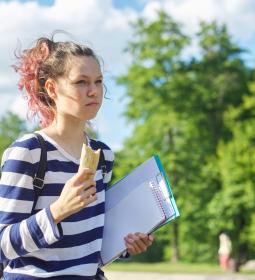The topic of education and learning pressure in South Korea is of great interest around the world. From childhood, Koreans are indoctrinated with the idea of the need to be at the top, which leads them to work hard to achieve the highest results. However, not everyone is given to become the best, and many have to at least try to meet generally accepted standards, which, alas, often leads to tragic consequences. How does education work in this advanced country?
From easy starts to toughest loads
It all starts from the junior grades (up to 12 years old). In South Korea, the approach to teaching in the primary grades is different from what we are used to. Younger students are immediately introduced to the basics of life: they learn to choose products, sort waste, clean and cook. There are no strict requirements for writing in the lessons, children do not rewrite their work 10 times because of mistakes - they use pencils, which makes it easy to correct mistakes.
However, this softer approach doesn't last forever, and as the transition to middle school, the workload on children begins to skyrocket. The ages of 12 to 15 are the time of transition when students are faced with an increased volume of assignments. But the real test begins in high school, when students are immersed in intensive exam preparation: tough final tests that have made schooling in South Korea known far beyond its borders.
High Expectations and Competition
In South Korea, striving for perfect grades and the status of the best student is almost a national idea. Competition between children is intensifying due to the rating system of education. In an environment where almost every student strives for excellent grades, rivalry reaches a fever pitch. The role of parents in this process is also crucial, as many of them expect their child to be the best of the best.
The period of preparation for final exams in South Korea is a real torment and test for a graduate. Students study from morning until late at night, sometimes even until night, because of additional classes, circles and specialized courses. If elementary and middle school students come to school around 9 a.m. and return home at about 6 p.m., having already completed their homework, then high school students are actually deprived of this time for rest.
Exam Day – Emergency in Korea
On the day of the final exams, the Korean authorities take exceptional measures to create an ideal environment for children. For example, in some places, planes are prohibited from taking off and landing to ensure silence around schools. The exams, covering five subjects, take place over the course of one day, with rest and lunch breaks.
Failure in exams is more likely to lead a student to deep emotional turmoil. Over the past decade, the number of suicides among young people in Korea has increased significantly, especially the risk of a wave of suicides on the day of the announcement of exam results.
Education as the best social elevator
In South Korea, admission to a university depends on the results of exams, and this, in turn, has the maximum impact on future career prospects. A degree from a prestigious university in Korea is a reliable path to a successful and financially stable career, which is why Korean schoolchildren are so diligent in their efforts to enter the country's leading universities. The higher the prestige of the university, the heavier the workload in the classroom.
Universities also have ranking systems, which forces students to constantly compete with other gifted students, which means that those students who are already tired of exhausting studies in high school will not find relief at university.
Problems of International Students
In addition to Korean youth, foreign students also study at the country's universities . They have their own rules and conditions for admission, especially for those who do not have Korean citizenship and do not correspond to the East Asian type of appearance.
Foreigners sometimes feel that they are treated with condescension: depending on their personal preferences, international students consider this attitude to be either a humiliation or, on the contrary, an advantage. However, this condescending attitude does not imply an increase in grades due to language difficulties or adaptation! If an international student performs average or low by Korean standards, it is explained by the fact that he is a foreigner, and to some, this sounds like some kind of excuse.
International students in Korea face other unique challenges, including dress code issues. The country has rules prohibiting female students from dyeing their hair, and foreign students with naturally blonde hair are sometimes asked to dye their hair black (!) to meet the standards set for a mono-ethnic society.
On the other hand, the educational system in Korea has its own significant advantages: universities and schools focus on practical and active learning, students constantly make presentations and projects, participate in performances, both individual and group. Particular attention is paid to the development of teamwork skills, which is an important aspect of professional training.










